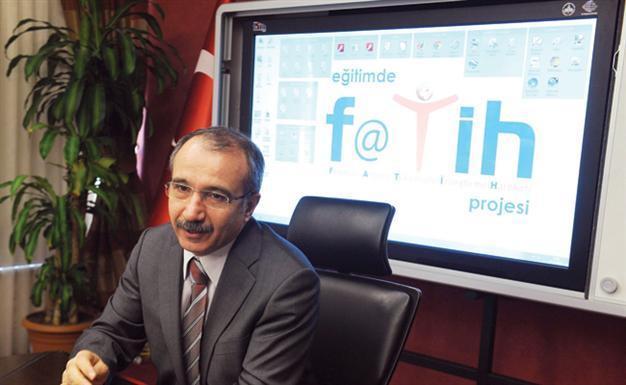Home study will have limited scope: minister
ANKARA - Hürriyet Daily News

Education Minister Ömer Dinçer speks to reporters. Dinçer told reporters yesterday that the school-starting age would be 60 months and the upper limit 72 months. DAILY NEWS photo, Selahattin SÖNMEZ
Only about 1 or 2 percent of students would qualify for home study,
Education Minister Ömer Dinçer said yesterday, seeking to ease concerns the government’s controversial education reform plan would undermine the schooling of girls.
“Graduates of secondary schools will have to enroll in high school. It is a must under the bill. Not everyone will have the distance-learning option. A cabinet decree will determine those within the scope of distance learning. Their number will be very limited, not more than 2 percent,” Dinçer told reporters, citing disabled students as an example.
Critics have said the option of home study after eight years would encourage conservative parents to take girls out of school and marry them off.
In further remarks, Dinçer said the “religious culture and ethics” classes would remain compulsory under the bill, and students would be allowed to choose elective courses to study Islam, Christianity or Alevism.
On another much-criticized point, the minister said the school-starting age would be 60 months and the upper limit 72 months. If a child turns 60 months in September, he or she will be enrolled in primary school.
Dinçer said the curriculum for first grade would be overhauled and brought closer to kindergarten programs to facilitate children’s adaptation to school. Some kindergarten teachers may be shifted to first-grade classes at primary schools, he said, without providing figures.
The ruling Justice and Development Party (AKP) rushed the education bill through the Education Commission March 11 in a session marred by unprecedented brawls. Commission chair Nabi Avcı took advantage of the chaos and hurriedly read out the draft, which was approved by AKP votes in half an hour.
The bill is also under fire for its early introduction of vocational classes, after four years of basic education. The reform is widely seen as an AKP move to re-open the secondary stage of the imam-hatip religious schools, which were closed in the late 1990s under an eight-year uninterrupted education program.
Dinçer argued such criticism missed the fundamentals of the bill, insisting students would be able to improve themselves according to their talents.
“Highlighting the imam-hatip schools puts the issue to an ideological debate. If a student is talented in music, he or she can take music classes, the same applies for sports or other areas. The education system will be more flexible and democratic,” he said.
Industry Minister Nihat Ergün, meanwhile, dismissed referendum calls for the approval of the education bill, which is to be put on a debate at the General Assembly in late March.
“The government at the time introduced eight-year uninterrupted education without any in-depth analysis. Now they call for a referendum. Was the eight-year uninterrupted education system approved by referendum so they are demanding a referendum now?” Ergün said.
Turkey,
